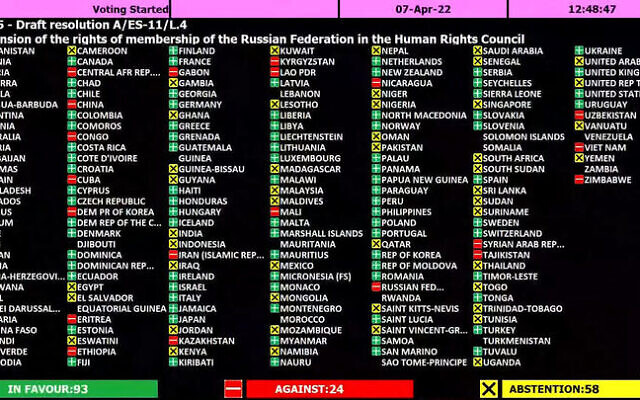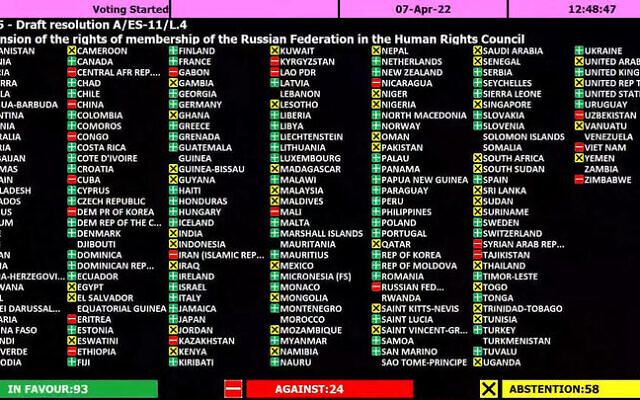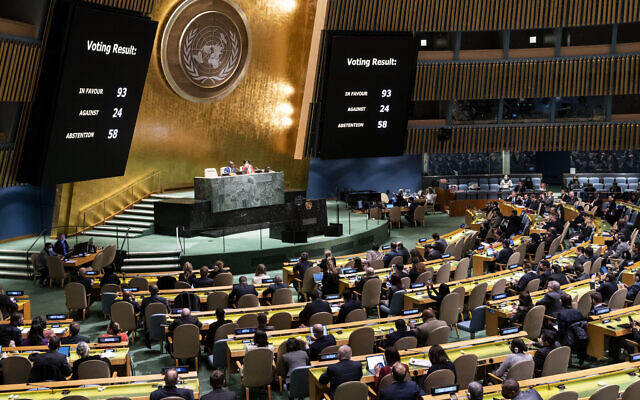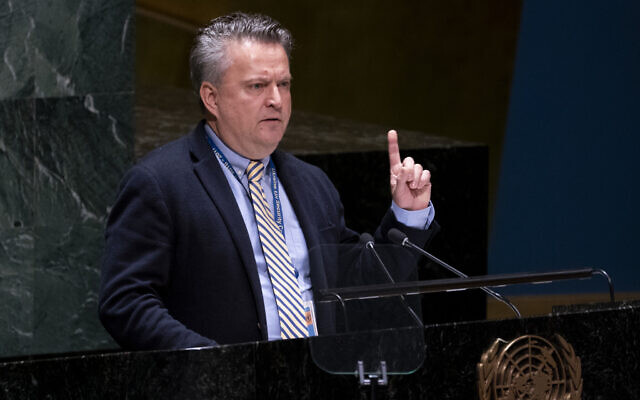
UN votes to suspend Russia from Human Rights Council, with Israel’s backing
UNITED NATIONS — The UN General Assembly voted Thursday to suspend Russia from the global organization’s leading human rights body over allegations of horrific rights violations by Russian soldiers in Ukraine, which the United States and Ukraine have characterized as war crimes.
The vote was 93-24 with 58 abstentions, significantly lower than the vote on two resolutions the assembly adopted last month demanding an immediate ceasefire in Ukraine, withdrawal of all Russian troops, and protection for civilians. Both of those resolutions were approved by at least 140 nations. Still, the measure received the two-thirds support needed to pass.
Russia is the second country to have its membership rights stripped at the Human Rights Council, which was established in 2006. In 2011, the assembly suspended Libya when upheaval in the North African country brought down longtime leader Muammar Gaddafi.
US Ambassador Linda Thomas-Greenfield launched the campaign to suspend Russia from its seat on the 47-member Human Rights Council in the wake of videos and photos of streets in the town of Bucha strewn with corpses of what appeared to be civilians after Russian soldiers retreated. The deaths have sparked global revulsion and calls for tougher sanctions on Russia, which has vehemently denied its troops were responsible.
Israel has avoided aligning too closely with either side since Russian troops invaded Ukraine on February 24. It is one of the few countries that maintains relatively warm relations with both Ukraine, a fellow Western democracy, and Russia, which controls the airspace over Syria, in which Israel operates to target Iranian proxies.
But on Thursday it once again joined the bloc of countries that voted against Russia — a stance it has maintained since drawing the Biden administration’s ire for declining to co-sponsor the first UN Security Council resolution against Moscow’s invasion of Ukraine in February. It has joined the West in condemning Russia in several UN resolutions since.
“Israel today supported a decision by the UN General Assembly to suspend Russia from its membership in the UN Human Rights Council, in the wake of the war in Ukraine, its unjustified invasion of it and the killing of innocent civilians,” the Foreign Ministry said in a statement following the vote.

Vote results at the UN General Assembly on a motion to suspend Russia from the Human Rights Council. (Courtesy)
Jerusalem has also moved slowly toward the West’s position against Russia more broadly, though there has been a delegation of responsibility between Prime Minister Naftali Bennett, who until recently sought to mediate between the sides and has largely avoided criticizing Russia, and Foreign Minister Yair Lapid, who has been much more vocal in his criticism. Both men condemned the massacre that took place in Bucha, but only Lapid fingered Russia as responsible.
Israel — backed at times by the US — has long accused the Human Rights Council of anti-Israel bias and has generally refused to cooperate with its investigators.
Lapid said that Thursday’s vote “does not change our position on the UN Council, which is an extremist, morally flawed, biased and essentially anti-Israel body that has been exploited since its inception by countries violating human rights in the world as a political tool, including to attack Israel.”
After last May’s Gaza war, UNHRC members voted overwhelmingly to launch an open-ended probe into Israel’s treatment of the Palestinians, infuriating Jerusalem further.
Ukraine said it was “grateful” for the decision to suspend Russia from the UN Human Rights Council, saying “war criminals” should not be represented in the body.
“War criminals have no place in UN bodies aimed at protecting human rights,” Ukrainian Foreign Minister Dmytro Kuleba said on Twitter. “Grateful to all member states which supported the relevant UNGA (United Nations General Assembly) resolution and chose the right side of history.”

A completed resolution vote tally to affirm the suspension of the Russian Federation from the United Nations Human Rights Council is displayed during a meeting of the United Nations General Assembly, on Thursday, April 7, 2022, at United Nations headquarters. (AP Photo/John Minchillo)
Russia voiced regret at its suspension, with Kremlin spokesman Dmitry Peskov telling Britain’s Sky News, “We’re sorry about that… And we’ll continue to defend our interests using every possible legal means.”
The countries voting against included China, a Moscow ally that has steadfastly abstained from criticizing the invasion. Others were Iran, the former Soviet republic of Kazakhstan, and communist Cuba, as well as Russia itself, Belarus, and Syria.
Despite pressure from Moscow for a no-vote, several African countries only abstained, such as South Africa and Senegal. Also abstaining were Brazil, Mexico, and India.
Explaining their decision not to support the resolution, some countries called it premature, noting that there are ongoing investigations into whether war crimes have occurred, or said it would undermine the credibility of the Human Rights Council and the United Nations. Others said the resolution reflected American and European geopolitical agendas and what opponents called Western hypocrisy and selective outrage about human rights.

Sergiy Kyslytsya, Permanent Representative of Ukraine to the United Nations, speaks during a meeting of the United Nations General Assembly, on Thursday, April 7, 2022, at United Nations headquarters. (AP Photo/John Minchillo)
The US argues that this punishment — suspending Russia from the Geneva-based organization that is the UN’s main human rights monitor — is more than symbolic and in fact intensifies Russia’s isolation after the assault on Ukraine that began on February 24.
Ukrainian President Volodymyr Zelensky has also called for Russia to be expelled from the UN Security Council “so it cannot block decisions about its own aggression, its own war.”
But Washington has admitted there is little anyone can do about Russia’s position on the Security Council, where it has a veto.
While the Human Rights Council is based in Geneva, its members are elected by the General Assembly for three-year terms. Russia’s term ends in December 2023.
The brief resolution that was approved Thursday expressed “grave concern at the ongoing human rights and humanitarian crisis in Ukraine, particularly at the reports of violations and abuses of human rights and violations of international humanitarian law by the Russian Federation, including gross and systematic violations and abuses of human rights.”
